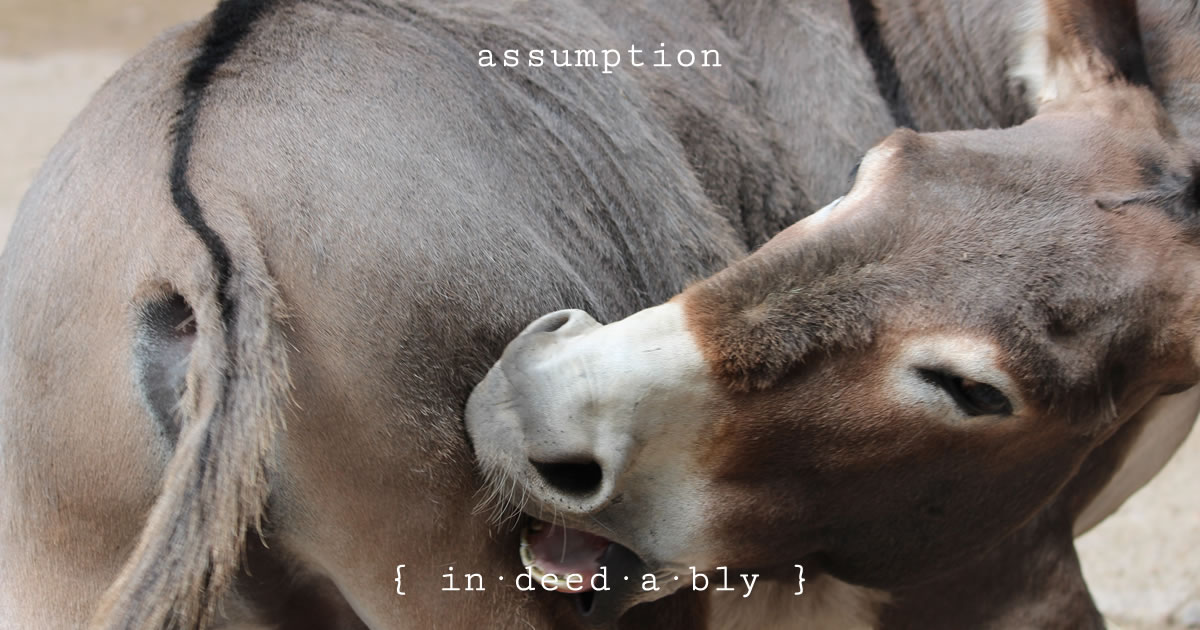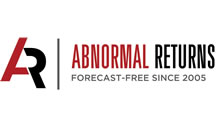Some may say that if you have 6 month’s worth of expenses in a bank account, you are safe. Financially assured. Possessing a buffer capable of absorbing all but the severest of emergencies.
Simplistic.
Plausible.
Maybe even true.
Some may say that if you have accumulated and invested 25 times your annual expenditure, you are done. Financially Independent. Have won the game. Need no longer be motivated by money.
Simplistic.
Marketable.
Maybe even true.
Yet few may say that the difference between weathering a financial storm and never worrying about money again is a simple factor of 50.
Simplistic.
Deductive.
Maybe even true.
These bite-sized morsels of fortune cookie wisdom and t-shirt slogan financial planning are based upon assumptions.
Assumptions big.
Assumptions small.
Assumptions cognisant.
Assumptions implicit.
It is an inconvenient truth that limitations such as these are true of all projections and plans. No matter how slick the presentation. Nor how expensive the advisor making them.
This raises some interesting questions about the assumptions those rules of thumb are built upon.
What if today to never ends?
Which year should form the expenditure baseline for those rules of thumb?
The most recent year?
For many of us, that covid disrupted lap of the sun was the most unusual in living memory. Wings clipped. Social lives curtailed. Dry cleaners and season tickets substituted for t-shirts and sweatpants. Overpriced gym memberships and store-bought sandwiches replaced by jogging and home-cooked meals.
We spent less.
We saved more.
Artificially induced.
Far from being representative of normal.
How about an average calculated over several recent years? Plausible. Smoothing out one-off shocks and distractions. Sensible for those comfortably settled into the boring “middle” part of our financial journeys. Less so for those nearer the beginning or the end.
Imagine basing your sums on the lifestyle you led as a broke student. Living in a group house. Subsisting on a diet of beer and ramen. Fun at the time, but a phase of life that most of us soon outgrow.
Predicating all your plans on the premise that lifestyle costs would never exceed those experienced when you were young, certain, and immortal. Nothing to lose. Not knowing any better.
Now imagine locking those assumptions in. Reaching that mythical 25x accessible liquid net worth figure, then hitting eject on the daily grind and its endless pursuit of “more”.
From a planning perspective, the assumption that spending shouldn’t exceed an annual expenditure amount becomes a cold hard reality. Baked in. By design.
To be sustainable, the naïve happy path where everything is awesome and nothing unpredictable occurs becomes the only viable path. Any divergence or random life happens event would invalidate the premise upon which those plans were based.
Forcing adaption. Change. Evolution.
Reprioritising and tightening belts, if possible.
Returning to the workforce, if not.
A fragile existence, made so by the mistaken belief that today will always represent your everyday.
Which raises a troubling question: at what point in our lives could a year ever be considered “normal”?
When is life ever normal?
There are numerous transient phases of our lives. Where our expenditure then would not provide a representative long term baseline of “normal”.
A person living alone incurs a higher cost burden than when that same person cohabitates with another. Economies of scale. In the context of a whole lifetime, which would be “normal”?
A couple without dependent children have a vastly different spending profile to that same couple should they become parents. Equally true for young couples just starting out as it is for empty nesters. In the context of planning for a financial lifetime, which would be “normal”? The ~20 years with dependent children, or the ~40 years without?
Eye-watering nursery fees can consume more cash flow than a monthly mortgage payment. Yet before long the child ages out, graduating to “big school”. Are those early childhood years expenses considered a brief aberration from the norm? Or will nursery fees give way to equally expensive private school tuition, an expenditure pattern potentially lasting 20 years or more?
But here is the thing. All those phases of our lives felt perfectly normal at the time. Yet in hindsight, the pace of change and volume of uncertainty we experience throughout life is astounding.
Few of us as children knew what we wanted to be when we grew up. Most adults still don’t know.
If you were to travel 20 years back in time and tell your younger self about your current life, how would they react?
Nodding along wearing the self-satisfied smile of someone who loves it when a plan comes together?
Or would they goldfish in disbelief at how differently things turned out from their current hopes and dreams?
Hopefully, they wouldn’t immediately burst into tears or run away screaming in horror at the mess you had made of their promising future!
Which raises the question of what makes us think that receiving a similar visit today, from our future selves 20 years hence, would go any more smoothly?
Hope.
Confidence.
Naïvety.
Optimism.
But probably not evidence!
The unknowable unknowns
The reality is we are all just guessing. Placing bets on the future and hoping for the best.
Some will undercook their numbers. Their rose coloured worldview paving the way for future disappointment. Hopefully content to enjoy the ride, despite their eventual destination falling short of where they originally sought to end up.
Others will be so scared of the unknown they can never have “enough”. Pessimism and uncertainty keeping them chained to the grindstone. Stopping only once they are physically or mentally unable to continue. Risking life passing them by as they endlessly seek out more.
The rest of us fall somewhere between those two ends of the spectrum. Adjusting the dials of risk and reward until we find a unique balance that works for us.
Some will chase higher returns or huge saving rates to reduce their timescales. At a price of increased uncertainty or reduced quality of life.
Others will adopt a slow and steady approach. Trading scarce precious time for a more certain outcome.
Anticipated rates of return, timescales, and withdrawal rates play a huge part in determining the outcome.
Nominal or real?
Before or after tax?
Current or historical averages?
Local currency holding its own or anticipating changes in relative purchasing power?
Local market returns where we live, or bubbly exuberant markets on the far side of the globe?
Assumptions all. Only verifiable in hindsight.
Which, after the fact, is about as helpful as somebody performing the “I told you so” dance!
The humble state pension might play a role in your planning.
Today, the English “new” state aged pension pays out the princely sum of £179.60 per week.
Which may not sound impressive at first glance. However, if we think of the state pension as an inflation-linked annuity, we can then calculate an approximate value for those future cash flows.
If we are fortunate enough to live for 5 years beyond the state pension eligibility age, the pension will have been worth the equivalent of nearly £45,000 in today’s money.
Live until we’re 80, and that value increases to more than £115,000 in today’s money.
Make it to 90, and our state pension “asset” would be worth over £180,000 in today’s money. That is more than 60% of the current median household net worth!
Which could make a major difference to how we meet our future cash flow requirements. Potentially reducing the net worth required to cover our expenditures earlier in life, as the state pension might help out during our elder days.
But only if a state-funded age pension continues to exist. In a form we qualify for. At some point in the future, potentially decades from now.
An unknowable unknown.
Quite the assumption.
Assumption
We all make assumptions in our planning.
Some are obvious, yet seldom discussed.
That you will live long enough for any of this to be a problem.
That the gap between your income and expenditure is large enough for savings to be a possibility.
That your assets won’t be frozen, nationalised, seized, or otherwise lost to civil disturbance, corruption, or conflict.
Others are hidden in plain sight.
Purchasing a home with a repayment mortgage is based on the assumption that you will be able to consistently generate an income sufficient to service the loan throughout its duration. Enjoying potentially 25-30 years worth of good luck or good management to maintain job security and skills relevance, all while avoiding serious illness or disability.
Borrowing on an interest-only basis assumes that asset prices will appreciate, or at least not decline. Inflation is our friend here, keeping more leaky leveraged investment boats afloat than their owners might care to admit.
The oft-quoted “my property is my pension” approach to financial management relies upon the assumption that a ready buyer will be waiting in the wings to purchase your old family home. That the price they are willing to pay is sufficiently high that, after clearing your mortgage, the residual amount is sufficient to both cover your new housing costs and support your lifestyle.
Which might even be true, assuming the factors upon which local housing prices are based remain constant. Unaffected by changing employment prospects, commuting patterns, or technology improvements. Yet consider what happens to property values in a soulless commuter town, if remote working became the default rather than the exception, and workers no longer needed to commute? Where would the buyers come from then? Who would be the next generation of greater fools?
We all make assumptions in our financial planning. What are yours?
References
- Gov.uk (2021), ‘The new State Pension‘
- Office of National Statistics (2020), ‘Household wealth by ethnicity, Great Britain: April 2016 to March 2018‘






David Andrews 28 August 2021
Trying to wargame all possible variables is guaranteed to give you sleepless nights.
Will my promised deferred DB pension scheme actually pay out or will it get rolled into the PPF. If I decide to transfer out Will I be able to find an adviser willing to act on my instructions ?
My key assumptions are that many (if not all) of those in charge are mostly more clueless than I am. I’ll continue to try and keep up to date with the ever changing rules of the game and adjust my plans accordingly.
LTA changes, adjustment to the state pension age, tax threshold freezes, changing RPI to CPI(H) have all caused adjustment to my previous assumptions but there are limits to what you can realistically plan for.
To some more planning levels would already be considered extreme. Some colleagues planning generally extended to how they are going to make it to the next pay day.
2 more years until I hit my full qualifying years of NI for the state pension and then only another 26 until I might receive anything. What could possibly go wrong ?
{in·deed·a·bly} 28 August 2021 — Post author
Thanks David.
Indeed! And about as effective as herding cats or trying to fold water.
I think you are onto the right approach. Don’t expect miracles. Do expect selfishness and incompetence. The rules will change in bizarre and often inexplicable ways. Take some risk, but spread it around. Get to the point of “enough” and then add some padding to smooth out the ride.
Boltt 30 August 2021
Hi David, I thought I was doing well hitting full pension credits at age 51 – how did you manage it 26 years before retirement age?
B
David Andrews 1 September 2021
Ah, the joy of typos when on a phone. I will also hit 35 years NI at 51.
Donna 28 August 2021
We do live in uncertain times, but I think that the ability to generate income is based, for most people, on being healthy. Throw a cancer diagnosis in the mix and it all comes crashing down, making the stock market disasters pale in comparison. Important not to lose sight of the importance of being healthy and enjoying time with the family! Money/wealth/status are important, but do not define our worth as individuals.
{in·deed·a·bly} 28 August 2021 — Post author
Thanks Donna.
Has anyone, ever, lived in certain times? I’m not sure that in the moment it would have felt like they had.
Just take the last decade or so as an example. We’ve had covid, Brexit, Trump, Black Lives Matter, #MeToo, terrorism, mass shootings, natural disasters, the London riots, and the European debt crisis. Yet for much of that time the economy has been growing, unemployment relatively low, bull markets running wild, and all things considered many of us had it pretty good compared to previous decades.
You’re exactly right about needing to look after ourselves. A health scare will certainly put all those spreadsheets into perspective, leading to prioritisation changes and a more balanced outlook focussing at least as much on enjoyment now as providing for the future later.
steveark 28 August 2021
My wife and my Social Security, the US state pension, will pay us 917 pounds a week in 2020 adjusted value when we start to draw it in five years. And there is zero risk that it won’t be there at that amount for at least the majority of our retirement years. Perhaps the single advantage of being older is there just isn’t time for the government to scheme that away from us. We’ll only have to draw 1% of our portfolio to keep our current six figure US spending lifestyle, adjusted for inflation. But as commenter Donna said above, while you can resolve the money issues you can’t eliminate the health risks. Facing some dicey surgery next week, that’s abundantly clear to me. The fifteen marathons and tens of thousands of miles I’ve run apparently did not offer much protection from a couple of serious medical conditions I’m dealing with. I think the greatest assumption we all tend to make is that we will not be hit by some silver bullet of a disease or syndrome that makes money seem not all that important.
{in·deed·a·bly} 28 August 2021 — Post author
Thanks Steveark. That sounds like a generous state pension you have coming, it is fascinating to observe how different countries approach the question of supporting their elder citizens.
Best of luck with your looming health challenges. Those miles and marathons may not have protected you from the genetic lottery, but admirably demonstrate you’re a tough and stubborn “old” bloke who will soon bounce back with flying colours.
Your observation about health challenges providing some perspective that leads to changed priorities is well made, it certainly did for me.
mrmedfi 28 August 2021
You touch on one of the true cruxes of financial independence, or indeed perhaps retirement in general. See Oscar Wilde for the low-down on making assumptions.
Certainly at my stage some of the only reasonable presumptions to make are that everything will change and the numbers will be wrong. Everything else is just noise. It’s why I have a ‘minimum viable plan’ and not a strict roadmap to FI(RE).
{in·deed·a·bly} 28 August 2021 — Post author
Thanks Mr MedFI. Great to see the picture I used for the story resonated with you!
I think there are few alternative rules of thumb that don’t get as much air time as they should.
“Enough” is only knowable in hindsight.
However much we have will never feel like enough in the moment, but we make do just the same.
Once we accept that longevity is the key driver to any planning calculations, and accept this is an unknowable number in all but the most tragic of circumstances, then we can make our peace with “good enough” guesstimates riddled with assumptions and get on with enjoying what we have.
The Bludger 29 August 2021
There is no security in a world of ceaseless change. Yet, change is what we hope will drive our portfolio up. This is the contradiction, we seek security in change but hope that the system (markets, governments, policies, health, environment etc) remains the same. Unfortunately, there are no guarantees that change will fall in our favor.
All we can do is play the odds and to learn to live with insecurity.
{in·deed·a·bly} 29 August 2021 — Post author
Change, but not too much change. And only the right sort!
Q-FI 12 September 2021
Any model is only as good as its assumptions. When I’m teaching anyone about valuation, we’ll do all the inputs, get the final NPV or IRR, and then I’ll tell them this scenario that we’re trying to estimate is basically guaranteed never to happen. The question is how wrong do we think we’ll be, rather than how right we think we are. I like using that mindset much better than, here is our projected and “final” number.
For me personally, I like to use assumptions in ranges. There’s never a single number or model, but a range of variations. I tend to be more on the conservative side as well when I do any modeling, but that’s just me. At the end of the day, if you haven’t built in some flexibility or other options, you’re essentially betting on luck. But hey, to each their own.
You can plan all day long, but at some point you have to live your life. What that balance will be is different for every person.
{in·deed·a·bly} 13 September 2021 — Post author
Thanks Q-FI, that is a sound approach.
An old insurance underwriter once taught me a little about how claims management works. They produce a set of estimates to provide that range of which you speak: best case, worst case, and most likely. Similar to the old military adage of hoping for the best while planning for the worst.